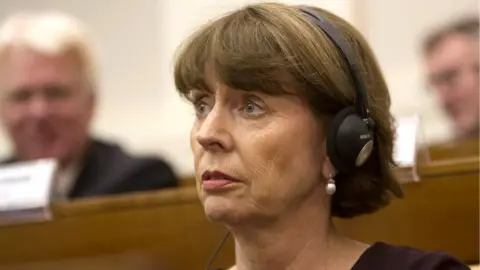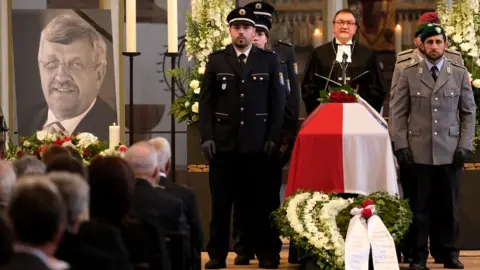German pro-immigration mayors get death threats
 Getty Images
Getty ImagesCologne mayor Henriette Reker, who survived a serious knife attack in 2015, has received a death threat just days after another German politician was shot dead, police say.
Ms Reker was previously targeted because of her pro-immigration stance.
At least one other pro-immigration mayor has been threatened, police said.
Authorities have said a person detained in connection with the shooting of Walter Lübcke earlier this month may be linked to a far-right network.
Police have not said if the latest threats are connected to the death of Mr Lübcke.
Investigators in Cologne said the note to Ms Reker may have been sent by a right-wing extremist, but did not provide further details, local media report.
Ms Reker, 62, said she would not be deterred by death threats or "retreat" from doing the job that she has been tasked to do, the newspaper Bild reported (in German).
Another person police said had received a threatening note was Andreas Hollstein, the mayor of Altena - a western German town known for having accepted more than its quota of migrants.
In November 2017, Mr Hollstein was stabbed and needed hospital treatment.
How was Ms Reker previously attacked?
In October 2015, a day before she was elected mayor of Cologne, Ms Reker was stabbed in the neck and seriously injured while out campaigning.
A 45-year-old man, named as Frank S, was convicted of attempted murder and jailed for 14 years.
He had links with right-wing groups and had targeted Ms Reker over her welcoming stance to refugees, a court found.
Ms Reker was head of refugee housing in Cologne at the time.
During her testimony, Ms Reker said she was "very worried that I could be paralysed'' and that she had suffered from nightmares.
She was put in an induced coma after the attack, which occurred at the height of Germany's refugee influx, and took over as mayor a month later.
What happened to Walter Lübcke?
Mr Lübcke, 65, was a leading member of Chancellor Angela Merkel's ruling centre-right CDU party and a supporter of her refugee policies.
In the early hours of Sunday 2 June, Mr Lübcke was found dead on the terrace of his home in the village of Istha, police said. He had died as the result of a bullet fired at close range.
Police immediately ruled out suicide and the case was taken over by federal prosecutors.
 Getty Images
Getty ImagesA suspect with links to far-right groups and a history of violence was later arrested based on DNA evidence from the scene, officials said.
They added that prosecutors were investigating whether the suspect acted alone or as part of a wider group.
Mr Lübcke, who is survived by a wife and two grown-up children, came to national prominence in October 2015 when he spoke out in favour of providing accommodation for refugees.
Germany had decided to let in Syrians fleeing the civil war, and large numbers of asylum seekers were crossing Germany's borders on a daily basis.
He reportedly received death threats and was given personal protection after telling a rowdy town hall meeting they had to stand up for Christian values.
Right-wing sentiment and extremism have been fuelled in Germany in recent years with the arrival of hundreds of thousands of people seeking asylum.
Last year, a deadly stabbing involving a Syrian and an Iraqi in the east German city of Chemnitz sparked mass protests by far-right activists. Counter protests followed, leading to violence and a number of injuries.
Mrs Merkel has previously said that "vigilante justice" will not be tolerated.
